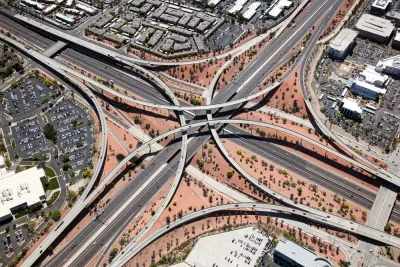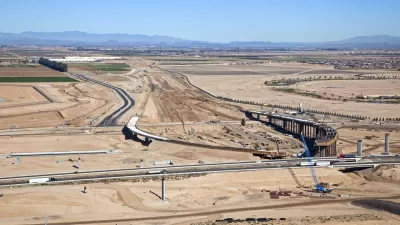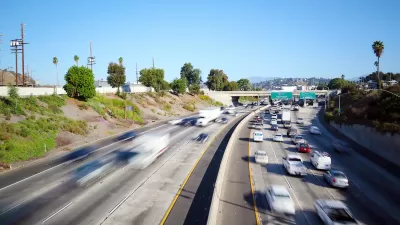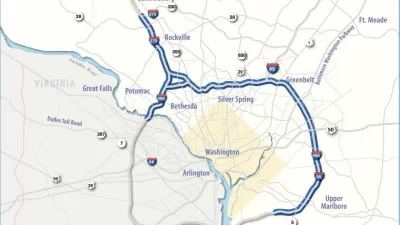Arizona state law requires Maricopa County to request approval from the state before it can send a transportation tax to the voters for approval.

“Gov. Doug Ducey shocked local leaders — many of them Republicans — when he vetoed a bill Wednesday that would have allowed Maricopa County to ask voters to extend a half-cent sales tax to fund major transportation projects for the next 25 years,” reports Jessica Boehm for Axios.
The Proposition 400 sales tax has been in place in Maricopa County since 1985, and was extended once in 2004. The transportation sales tax is set to expire in 2025. “Proposition 400 has provided funding for almost every major transportation project in metro Phoenix, including Loops 101, 202 and 303,” according to the article.
The Momentum Investment Plan, a long-term transportation plan approved in June 2021 with the Proposition 400 extension in mind, targeted more than 350 miles of new freeway and highway lanes, including 186 miles of new HOV lanes, 1,300 miles of new or improved of arterial roads, and about 12 miles of new light rail, 37 miles of bus rapid transit, and 7 miles of new streetcar, according to the article.
The plan, and Proposition 400, has the support of every mayor and tribal leader in Maricopa County, according to Boehm. Gov. Doug Ducey, however, vetoed the plan. In a letter explaining the decision, Ducey said: “now, with inflation higher than it has been in 40 years, is not the time to ask Arizona voters to tax themselves.”
FULL STORY: Why Arizona's governor vetoed Maricopa County's Prop 400 election

Study: Maui’s Plan to Convert Vacation Rentals to Long-Term Housing Could Cause Nearly $1 Billion Economic Loss
The plan would reduce visitor accommodation by 25,% resulting in 1,900 jobs lost.

North Texas Transit Leaders Tout Benefits of TOD for Growing Region
At a summit focused on transit-oriented development, policymakers discussed how North Texas’ expanded light rail system can serve as a tool for economic growth.

Why Should We Subsidize Public Transportation?
Many public transit agencies face financial stress due to rising costs, declining fare revenue, and declining subsidies. Transit advocates must provide a strong business case for increasing public transit funding.

How to Make US Trains Faster
Changes to boarding platforms and a switch to electric trains could improve U.S. passenger rail service without the added cost of high-speed rail.

Columbia’s Revitalized ‘Loop’ Is a Hub for Local Entrepreneurs
A focus on small businesses is helping a commercial corridor in Columbia, Missouri thrive.

Invasive Insect Threatens Minnesota’s Ash Forests
The Emerald Ash Borer is a rapidly spreading invasive pest threatening Minnesota’s ash trees, and homeowners are encouraged to plant diverse replacement species, avoid moving ash firewood, and monitor for signs of infestation.
Urban Design for Planners 1: Software Tools
This six-course series explores essential urban design concepts using open source software and equips planners with the tools they need to participate fully in the urban design process.
Planning for Universal Design
Learn the tools for implementing Universal Design in planning regulations.
City of Santa Clarita
Ascent Environmental
Institute for Housing and Urban Development Studies (IHS)
City of Grandview
Harvard GSD Executive Education
Toledo-Lucas County Plan Commissions
Salt Lake City
NYU Wagner Graduate School of Public Service





























